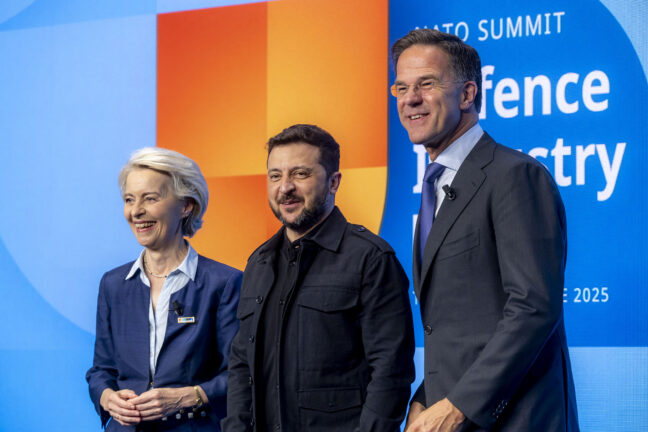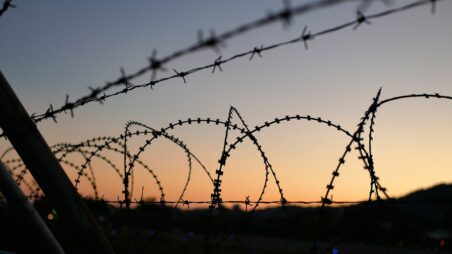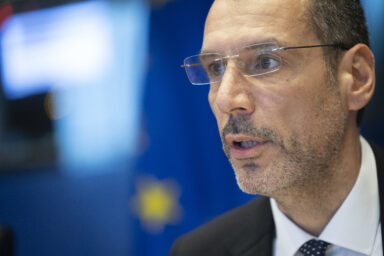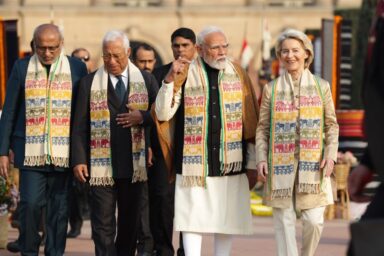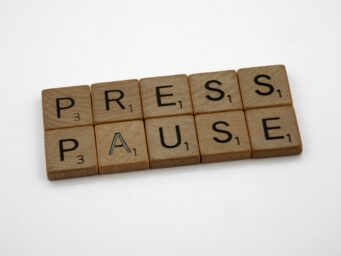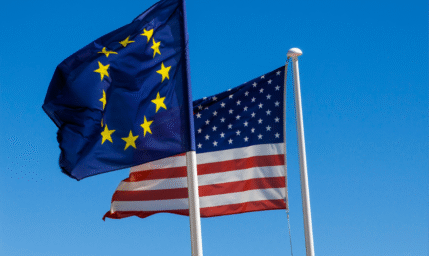Nato leaders agreed on Wednesday to increase defense spending to five per cent of GDP and won Washington’s renewed “ironclad commitment” to mutual defense. The European Union, however, was but an afterthought.
The decision from the North Atlantic Treaty Organization’s 32 members at their high-stakes summit in The Hague is a major win for Donald Trump who has repeatedly lambasted his European allies for underspending on security. Mr Trump, who wavered in his commitment in the lead-up to the summit, on Wednesday called it a “tremendous” gathering and pledged his backing for Article 5, which requires members to defend each other from attack.
‘United and steadfast‘
The outcome is also a win for European Nato leaders, as they won—for now, anyway—Washington’s support. At a time when Russia’s belligerence grows by the day, it was crucial. “I stand with it,” Mr Trump told reporters after a 2 1/2-hour working session with Nato leaders. “That’s why I’m here.”
The declaration won unanimous endorsement at the end of the two-day summit in the Netherlands. It states that allies “reaffirm our ironclad commitment to collective defence”. They also “remain united and steadfast in our resolve to protect our one billion citizens, defend the Alliance, and safeguard our freedom and democracy,” Bloomberg reports.
As allied leaders converged on The Hague for a critical Nato summit on Tuesday, Secretary General Mark Rutte was battling to prevent the gathering from spiralling into disarray. Mr Trump, en route to the Netherlands, had once again cast doubt on America’s commitment to defend its allies—a persistent source of transatlantic tension.
You might be interested
You will achieve something no American president in decades could get done. – Mark Rutte, Nato Secretary General
Delicate tightrope walk
Before Mr Trump’s departure, Mr Rutte dispatched a private message, praising the president for halting the conflict between Israel and Iran and securing increased European defence spending. Mr Trump promptly shared a screenshot of the message on social media.
“You will achieve something NO American president in decades could get done,” Mr Rutte wrote, a message confirmed by Nato’s press office. “Europe is going to pay in a BIG way, as they should, and it will be your win.” The message, while seemingly effusive, underscored the delicate diplomatic tightrope Mr Rutte was walking.
Mr Rutte had orchestrated the summit to secure a renewed commitment from Mr Trump to Nato’s Article 5—the mutual defence clause considered the bedrock of the alliance. He had pressed member states to meet Mr Trump’s demand of allocating five per cent of GDP to defence budgets and meticulously planned the two-day event to minimise any potential irritants for the mercurial US leader.
Spain in the back
However, these plans appeared shaky when Mr Trump, during final preparations, questioned the US commitment to defending its Nato allies. “Depends on your definition” of the Article 5 obligation, Mr Trump told reporters aboard Air Force One. “There’s numerous definitions of Article 5. You know that, right? But I’m committed to being their friends, you know, I’ve become friends with many of those leaders, and I’m committed to helping them.” This ambiguity, far from reassuring allies, amplified anxieties regarding the US’s reliability.
Adding to the complexity was Spain’s reluctance to endorse Mr Rutte’s spending plans—a matter that had also captured Mr Trump’s attention. “Always a problem with Spain,” Mr Trump remarked. “Spain’s not agreeing, which is very unfair to the rest of them, frankly.”
A subsequent post on Truth Social highlighted Spain’s defence budget. Following Spain’s informal exemption from the five per cent target, secured during weekend negotiations with Mr Rutte, Slovakia’s Robert Fico requested similar leniency. Canada’s foreign minister, Anita Anand, voiced a desire for a review of the target. “We like to see steps along the way where there can be a re-examination of whether this is the right approach,” Ms Anand told reporters in The Hague.
‘Russia will go beyond Ukraine‘
Article 5, conceived in the aftermath of the Second World War, has served as the cornerstone of the Nato pact—protecting Western Europe from Soviet influence during the Cold War and underpinning the US-led alliance since. Yet, it has long been a point of contention for Mr Trump, who has argued that US allies excessively rely on Washington’s defence spending and should contribute more to collective security. During his first term, Mr Trump threatened to withdraw from Nato, and last year suggested he would allow Russia to do “whatever the hell they want” to allies not meeting spending targets.
The US commitment to Nato security has become a growing concern for officials in Brussels, Berlin, and Paris. This apprehension has intensified as Mr Trump has advocated for a peace deal in Ukraine, pushing much of the responsibility for maintaining it onto Europe.
Russia actively and aggressively threatens the security and freedom of the entire Atlantic space. – Friedrich Merz, Chancellor of Germany
Germany, under the new leadership of Chancellor Friedrich Merz, is embracing its security responsibilities. Mr Merz told lawmakers in Berlin that he would construct Europe’s strongest conventional military to defend the continent from Russia. “Because Russia, above all, actively and aggressively threatens the security and freedom of the entire Atlantic space,” the Bundeskanzler stated. “We have to fear that Russia will expand its war beyond Ukraine.” This shift in German policy reflects a growing recognition of the need for Europe to assume greater responsibility for its defence.
Zelensky ‘among friends‘
Against this backdrop of uncertainty, Ursula von der Leyen, President of the European Commission, reaffirmed the EU’s commitment to Ukraine and the importance of investing in its defence industry. “Volodymyr, you are here among friends,” she stated, addressing Ukrainian president Volodymyr Zelensky, who was present.
“And we stand by Ukraine from the very first day on, and you can count on us, also for the future.” She highlighted the EU’s proposed funding programme, SAFE, designed to enable member states, Ukraine, and other partners to access loans for direct investment in Ukraine’s defence sector. “Your industry has demonstrated a remarkable ability to innovate, and to produce rapidly, reliably, and at scale,” she added.
The EC President insisted on the need to “put pressure on President Putin, that he comes to the negotiation table and that he is engaging seriously in negotiations for a just and lasting peace,” outlining the EU’s 18th sanctions package, with the expectation of similar measures from G7 partners. Despite her efforts, however, it was difficult not to see that the European Union was left standing at the sidelines.
Peace through strength
Meanwhile, Mr Rutte was keen to highlight the increased defence spending commitments being made by European nations. He pointed to Germany’s announcement “that Germany wants to reach the 3.5 per cent of core defence spending, and therefore the overall 5 per cent. Not in 2035, they want to reach it in 2029.” He also cited commitments from Sweden and Norway, and noted that countries like Poland, Estonia, Latvia, Lithuania and Finland were “very close, already over the threshold.”
For Mr Rutte, this increased spending was vital, “Because we know that that Russia is reconstituting itself at a pace, at a speed which is really staggering and frightening. And so we have to stand ready. If we don’t, we cannot defend ourselves in three to five years from now. Today, they know if they try anything, our reaction will be devastating, but we have to make sure that in three to five years they won’t try. So if you want to prevent war, spend more. Peace through strength. We can put every label on it, but they are all true. So this is really historic.”
Commitments and expectations
Mr Rutte also sought to reassure any doubters about the US’s commitment to Nato. He rhetorically asked, “Question number one was, ‘Mark, is the US still with us?’ Yes, they are. You might want to turn on your television when Emmanuel Macron is visiting the Oval Office, when Keir Starmer is visiting the Oval Office, when Giorgia Meloni is, hey, by the way, when I was visiting, you might want to see that footage. There is total commitment by the US President and the US senior leadership to Nato.”
There is total commitment by the US President and the US senior leadership to Nato. – Mark Rutte, Nato Secretary General
However, Mr. Rutte acknowledged that this commitment came with expectations. “And the expectation is that we will finally deal with this huge ‘pebble in the shoe,’ this huge irritant, which is that we are not spending enough, as Europeans and Canadians. They want us to equalise with what the US is spending. And when it comes to this famous fove per cent in the US is, well, basically they’re there,“ the Secretary General said.
“When you look at what they spend on core but also on all the defence and security related investments. But they want to equalise what they’re spending with us. And for us, of course, the main argument is not to equalise. Yes, that is important, because it is fair. But the real reason to do this, the first reason to do this, is the Russia threat. So these things come together,” Nato‘s top dog stressed.
